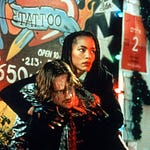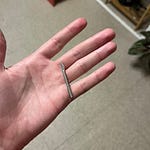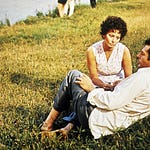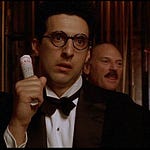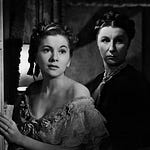Smothering though our bewitchment by “generation,” as an organizing principle, may be, I think it’s safe to say that The Brave Little Toaster—Toy Story’s darksided 1987 ur-text—is a millennial touchstone. Following the adventures of a group of household appliances searching for their “Master,” the young boy they live to serve, our inanimate heroes are animated by creamy colors, cheerful singalongs, and the ever-present threat of obsolescence, physical destruction, and ultimately psychic death. Such is the fate of the dubiously-gendered sentient consumer good.
Toaster's first kill happens just a few minutes into the movie. Taunted by a malevolent air conditioning unit who claims that the little boy will never return to the vacation cabin where they all live, Toaster and its friends accuse Air Conditioner of jealousy (Master doesn’t play with HVAC, you see), triggering it until it overheats and explodes, leaving behind a smoking corpse wedged into the windowsill.
Voiced by the late, great Phil Hartman, the cruelly sarcastic Air Conditioner is obviously a caricature of Jack Nicholson. Sneering and leering like the Great Pumpkin of New Hollywood himself, Air Conditioner’s filtration design suggests Jack’s shining cupid’s bow, broadly and brightly dimpling and from which point gravity’s obligate rainbow drags his facial excess down into cinema’s original Jokerfied grin. From the raspy voice to the idiosyncratic cadence to the plasticine brow, there’s no missing the resemblance. But for me, Air Conditioner didn’t register as a cameo, as it were, because I didn’t recognize the source material. It would take years, both of caricatures like Hartman’s and the opportunity to see the original himself in other movies, for me to pick up on the homage.
When my parents were children, cinema legends like Peter Lorre (another film star lampooned by Hartman in Toaster, he as a bag-eyed light fixture), Katherine Hepburn, and Humphrey Bogart often turned up the cartoons they watched. I wonder how often my parents recognized them, and how often they were assumed to be a strange new character in a harem of scribbled freaks. Nicholson’s ambience took place before my awareness, while I was still in the early stages of sponging up the culture; I suppose that’s how ambience works. But eventually, Nicholson would come to be as recognizable to me as Jesus, Elvis, the president, etc., as I was reminded when Jade and I watched Easy Rider (1969) for the first time last week.
Nicholson’s role as the alcoholic lawyer who delivers the film’s keynote—“What you represent to them,” he informs his hippie comrades hours before his own brutal murder, “is freedom.”—got me. Earnest and boyish, he’s a pre-calcified Nicholson, who for all his remarkable versatility suffers from the constraints of caricature, as all greats must. When was the last time he was in something? I wondered. Now 85, he’s elderly enough that he no longer appears at Knicks games or in the tabloids along with Lindsay Lohan. One assumes he’s been made comfortable in a mansion, smoking stogies and reminiscing about a coffee shop called Poopie’s, up on the strip, the phlegm rich and murky in his agéd throat.
I love a genius. Every so often I develop a little romance with a new one, sacking the library for their books and piping in podcasts about their illustrious lives. In one interview, Jack humbly responded to a question about missed opportunity (he famously passed on The Godfather, among other classics) by quoting his own mother: “All comparisons are odious.”
But comparison is its own pleasure, and there’s much to be found in the long life of a great and productive artist. I’ll never be anything but a writer, but as artists I think we ought to study forms other than our own, which is why I care about the Method, or Italian Neo-Realism, or queer of color critique. Gone about a certain way, comparison erodes the difference upon which it relies. Caricature is undone, and yet ever ascends.
Find me on Twitter. Get my second novel, X, right here.
Subscribe to support GOOD ADVICE/BAD GAY, DAVID’s advice series from an anonymous gay therapist who’s not afraid to hurt your feelings with the truth. (Sample an unlocked post for a taste of what you’re missing.) 100% of funds go to support a rotating selection of mutual aid and reparations projects.
Want advice? Email badgayadvice@gmail.com for a free 3-month subscription.





